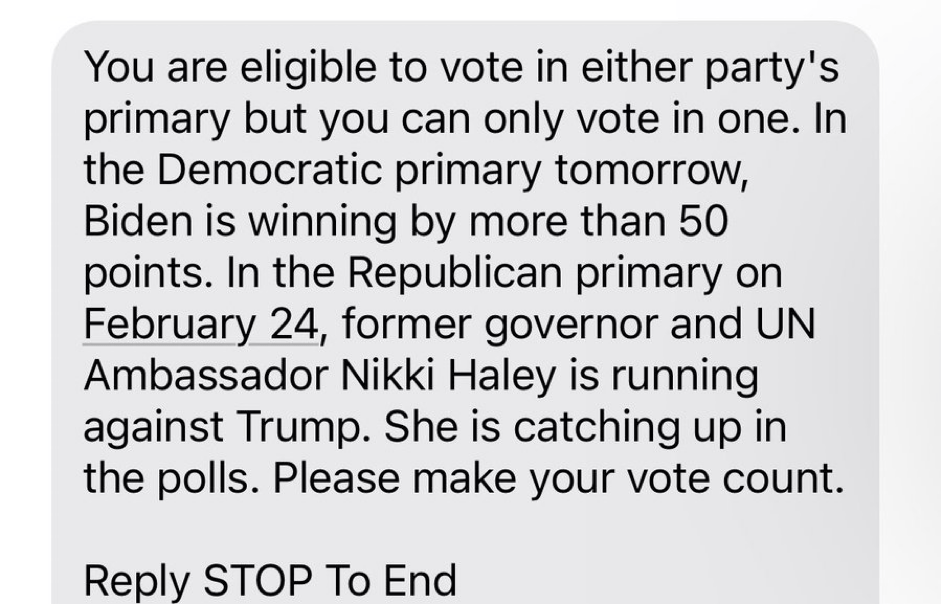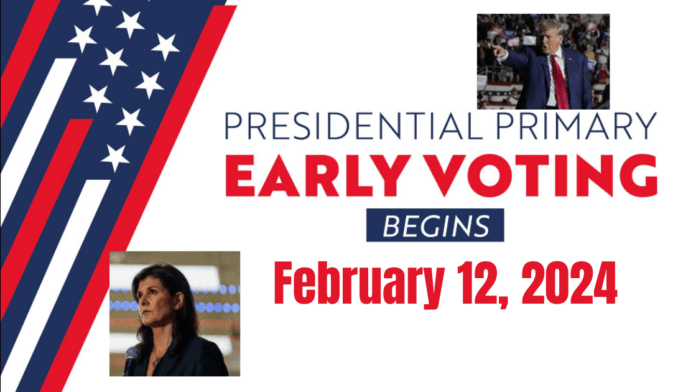Early voting in the SC primary begins this Monday. It is the Republican primary. The Republican primary is the major primary in the state.
Only 132,000 people voted in the SC Democrat Party primary.
Hundreds of thousands more are expected to vote in the Republican primary which concludes on February 24th.
Early voting in the SC primary is Haley’s best shot

Ballot Harvesting by her associates, including campaign strategies by Walter Whetsell, S.C. campaign manager for Nikki Haley, is the former Governor’s best opportunity to make this a close primary. Early voting in the SC primary provides Haley this opportunity.
Haley lost to NONE OF THESE CANDIDATES in Nevada last night. However, Haley and Whetsell have been working overtime courting Democratic voters in her home state.
She hopes to make the race competitive here with Democrat voter support.
ABOUT BALLOT HARVESTING
The Controversy Surrounding Ballot Harvesting
Ballot harvesting has become a hotly debated topic in recent years, with strong opinions on both sides. Advocates argue that it helps increase voter turnout and ensures that every vote is counted. They believe it provides convenience for voters who may have difficulty getting to the polls or mailing their ballots. However, opponents raise concerns about potential fraud and manipulation of the electoral process.
Critics claim that ballot harvesting opens the door to coercion and undue influence on vulnerable populations, such as elderly, minorities, or disabled individuals. They worry that unscrupulous actors could gather multiple ballots from these individuals without their consent or even alter their votes. This raises serious questions about the integrity of elections and undermines public trust in the democratic process.
Proponents of ballot harvesting counter these arguments by pointing out that safeguards can be put in place to prevent abuse. For example, some states require strict identification protocols for those collecting ballots, while others limit the number of ballots an individual can collect. These measures aim to minimize the risk of fraud while still allowing for increased access to voting.
Despite these precautions, critics remain skeptical and emphasize instances where alleged irregularities occurred due to ballot harvesting practices. The controversy surrounding this issue highlights larger debates over election security and accessibility.
As different states grapple with this contentious topic, it’s evident there is no one-size-fits-all solution when it comes to ballot harvesting regulations. Each state must weigh its own unique circumstances against competing interests like voter access versus safeguarding against potential fraud.
The debate shows no signs of abating anytime soon as lawmakers continue to introduce bills either supporting or limiting ballot harvesting practices across the country.
How Does Ballot Harvesting Work?
Ballot harvesting is a practice that involves the collection and delivery of voted ballots by individuals who are not election officials or family members. It can be seen as either an efficient way to increase voter participation or as a potential avenue for fraud, depending on one’s perspective.
So how does ballot harvesting work? In states where it is allowed, political operatives or volunteers go door-to-door to collect absentee ballots from voters. They may also set up drop-off locations in public places such as community centers or churches, where individuals can submit their completed ballots.
Once collected, these harvested ballots are then delivered to election officials for counting. This process aims to make it easier for those who may have difficulty accessing traditional voting methods, such as the elderly or disabled.
However, critics argue that ballot harvesting raises concerns about the security and integrity of elections. They worry that unscrupulous individuals could tamper with or discard collected ballots, potentially influencing the outcome of an election.
Supporters of ballot harvesting contend that it helps ensure every vote counts by removing barriers to participation. They believe it empowers marginalized communities and increases voter turnout overall.
The legality of ballot harvesting varies from state to state. Some states have strict regulations prohibiting any form of third-party collection, while others explicitly allow and regulate this practice.
In conclusion (without using those words), understanding how ballot harvesting works sheds light on its potential impact on elections. The debate surrounding this controversial practice continues, with proponents emphasizing increased access to voting and opponents expressing concerns about fraud risks. Whether you view it as a valuable tool for democratic participation or a threat to electoral integrity depends largely on your perspective and interpretation of the available evidence
Arguments For and Against Ballot Harvesting
Supporters of ballot harvesting argue that it increases voter turnout and accessibility. They believe that by allowing individuals to collect and deliver ballots on behalf of others, especially those who may face difficulties in accessing polling locations, more people can participate in the democratic process.
They also claim that ballot harvesting helps to ensure that every vote is counted. By having someone physically collect and deliver the ballots, they argue that it reduces the chances of ballots being lost or not reaching their intended destination.
Furthermore, proponents state that ballot harvesting promotes inclusivity by empowering marginalized communities. It allows community organizers or activists to engage with voters directly, building trust and encouraging participation among traditionally underrepresented groups.
On the other hand, opponents argue that ballot harvesting opens the door for potential fraud and abuse. They express concerns about coercion or manipulation by those collecting the ballots, potentially pressuring individuals into voting a certain way or even discarding unwanted votes.
Critics also highlight privacy concerns related to giving personal information on sealed envelopes containing filled-out ballots to third-party collectors. They fear this could compromise confidentiality and undermine voters’ confidence in the integrity of elections.
Additionally, detractors point out logistical challenges associated with verifying signatures when multiple people handle a ballot before it reaches election officials. This raises doubts about whether proper authentication procedures are followed throughout the entire collection process.
These arguments reflect some key points made both for and against ballot harvesting practices. The ongoing debate around this topic underscores its complexity as policymakers strive to find a balance between improving accessibility while maintaining security in our electoral system.
The Impact of Ballot Harvesting on Elections
Supporters argue that by allowing designated individuals or organizations to collect and submit ballots on behalf of voters, those who may have difficulty accessing polling stations are still able to participate in elections. This can be particularly beneficial for elderly individuals, people with disabilities, or those living in remote areas.
Another impact is the increased voter turnout that some states have seen as a result of implementing ballot harvesting practices. By making it easier for individuals to vote, especially during times when traditional voting methods may be challenging (such as during a pandemic), more people are encouraged to exercise their right to vote.
However, opponents express concerns about potential vulnerabilities associated with ballot collection and submission. They argue that allowing third parties access to multiple ballots creates opportunities for coercion, fraud, and tampering with election results. These concerns highlight the need for robust safeguards and regulations around ballot harvesting processes.
Democrats excel in Ballot Harvesting
Additionally, another impact worth considering is the influence that large-scale ballot collection efforts can have on election outcomes. Critics suggest that partisan groups could utilize ballot harvesting strategies strategically targeted towards certain demographics or regions in order to sway election results in their favor.
As more states debate whether or not to allow or regulate this practice within their electoral systems, understanding both sides of the argument becomes crucial. Balancing accessibility with security will continue shaping discussions surrounding this controversial issue.
In short, however, America First Republicans are required to respond to this new reality.
Ballot Harvesting is here. Voters can be sure that Haley will do all she can to garner Democrat voter support. Early voting in the SC primary gives Haley this optimum chance at Ballot Harvesting.


